General Dentistry

Understanding All on 4 Dental Implants
All on 4 dental implants is a state-of-the-art dental procedure designed to provide a permanent and effective solution for patients with missing teeth. Unlike traditional dentures, which rest on the gums and often require adhesives for stability, All on 4 implants use four strategically placed implants – two on the top and two on the bottom – to support a full set of prosthetic teeth. This innovative approach ensures a more secure and natural-feeling tooth replacement.
Implant-retained Dentures
Similar to All on 4 dental implants, implant-retained dentures are anchored to implants placed into the jaw bone and offer increased stability compared to traditional removable dentures. However, implant-retained dentures usually require more than four implants – typically between 5-8 per arch.
Comparing All on 4 Implants to Traditional Dentures
- Stability and Comfort
All on 4 Dental implants stand out in terms of stability and comfort. With four strategically positioned implants securing the prosthetic teeth, patients experience a more secure fit that eliminates the concerns of slippage or discomfort associated with traditional dentures. The anchored implants provide a strong foundation, allowing for a more natural bite and increased confidence while speaking or eating.
- Maintenance and Cleaning
Traditional dentures require meticulous cleaning and maintenance routines, often involving adhesives and soaking solutions. In contrast, All on 4 implants can be cared for just like natural teeth. Regular brushing and flossing, along with routine dental check-ups, are sufficient to maintain optimal oral hygiene. This simplicity in care can be a significant factor for those seeking a hassle-free dental solution.
- Bone Preservation
One of the significant advantages of All on 4 implants is their ability to preserve bone density. Traditional dentures, over time, may contribute to bone loss due to a lack of bone stimulation. But since All on 4 implants integrate with the jawbone, they can help maintain bone density and prevent the facial structure from deteriorating.
While All on 4 Dental implants offer remarkable stability and durability, some patients may find implant-retained dentures to be a suitable compromise. These dentures provide enhanced stability compared to traditional options but may not match the permanence and comfort level of All on 4 implants. The choice between the two ultimately depends on individual preferences, lifestyle, and budget considerations.
In the quest for a durable and natural-looking solution to missing teeth, dental implants in Sparks emerge as a compelling alternative to traditional dentures. The stability, comfort, and ease of maintenance associated with All on 4 implants make them a preferred choice for many seeking a long-term solution. However, individual needs and preferences play a crucial role in determining the most suitable option. Consulting with a qualified implant dentist in Sparks is the first step towards achieving a confident and functional smile that lasts a lifetime.
You’ll always hear your dentist in Sparks say just how important brushing and flossing are to your oral and overall health. However, the order in which these tasks are performed can significantly impact their effectiveness. Let’s explore the proper steps to take when flossing and brushing your teeth, emphasizing the crucial role of flossing before brushing.
Step 1: Begin with Flossing
Flossing is often an overlooked but vital step in achieving optimal oral health. It helps remove plaque and food particles from between your teeth and along the gumline, areas that a toothbrush alone may struggle to reach. Flossing before you brush your teeth will help loosen up any of these lingering pieces of food, bacteria, or plaque and then you can brush them away. To ensure you get the most out of your flossing routine, follow these steps:
- Choose the Right Floss: There are various types of dental floss available, including waxed and unwaxed, flavored and unflavored, and dental tape. Select one that suits your preference to encourage consistent use.
- Take an Adequate Amount of Floss: A general rule of thumb is to use about 18 inches of dental floss. Wind most of it around the finger of one hand and the rest around another finger of the other hand, leaving a few inches of floss in between.
- Use Proper Technique: Hold the floss between your thumbs and index fingers, leaving a one-inch section for cleaning. Gently slide the floss between your teeth, curving it around each tooth in a ‘C’ shape. Be careful not to snap or force the floss as it may injure your gums.
- Clean Both Sides of Each Tooth: As you move from tooth to tooth, ensure you clean both sides of each tooth, reaching down to the gumline. This comprehensive approach helps eliminate hidden plaque and bacteria.
Step 2: Move on to Brushing
Now that you’ve thoroughly cleaned the spaces between your teeth, it’s time to move on to brushing. Brushing helps remove remaining plaque, bacteria, and debris from the surfaces of your teeth. Here’s how to make the most of your brushing routine:
- Choose the Right Toothbrush: Select a toothbrush with soft bristles to avoid damaging your enamel and gums. Electric toothbrushes can also be effective, providing consistent and thorough cleaning.
- Apply the Right Amount of Toothpaste: A pea-sized amount of fluoride toothpaste is sufficient for effective cleaning. Excessive toothpaste can lead to foaming and may not provide additional benefits.
- Brush in Circular Motions: Hold your toothbrush at a 45-degree angle to your gums and brush in gentle circular motions. Ensure you cover all surfaces of your teeth, including the fronts, backs, and chewing surfaces.
- Don’t Forget Your Tongue and Gumline: Gently brush your tongue to remove bacteria and refresh your breath. Additionally, pay attention to your gumline, as this area is prone to plaque buildup.
- Replace Your Toothbrush Regularly: If your toothbrush bristles become frayed or worn, it’s time for a replacement. Old toothbrushes may not clean your teeth effectively and can harbor bacteria.
By following this comprehensive flossing and brushing routine, you can significantly enhance and protect your oral health. Remember, consistency is key. Aim to floss and brush at least twice a day, and don’t forget to schedule regular dental check-ups and cleanings with your dentist in Sparks.
February 9th is Toothache Day
February 9th might seem like just another day in the midst of winter, but it’s also a special day for your dentist in Sparks. It’s Toothache Day. While most people would prefer to celebrate love and romance during the month of February, acknowledging the discomfort and often bad timing of a toothache may seem like an odd choice. However, considering just how common toothaches are, dedicating a day to raise awareness about them is not only relevant but also crucial.
Origins of Toothache Day
The origins of Toothache Day are somewhat unclear, but its observance can be linked to the need for increased awareness about dental hygiene. Many dental associations and healthcare professionals leverage this day to educate the public on the importance of the role of regular dental check-ups, proper oral hygiene practices, and nutrition in maintaining healthy teeth and gums. Afterall, toothaches can often be prevented or stopped quickly in their tracks.
Prevention is Key
Preventing toothaches starts with adopting good oral hygiene habits. Brushing and flossing daily as well as seeing your dentist in Sparks at least every six months are the foundations of a healthy dental routine. Toothache Day serves as a gentle nudge for individuals to reassess their oral care habits and make necessary adjustments.
Regular Dental Check-ups
One of the most effective ways to prevent toothaches is through regular dental check-ups. Dentists can detect potential issues early on, preventing them from developing into painful conditions. Toothache Day encourages people to schedule routine dental appointments and prioritize their oral health.
The Role of Nutrition
A balanced diet plays a crucial role in maintaining healthy teeth and gums. Toothache Day is the perfect time to reflect on dietary choices and their impact on oral health. Foods rich in calcium, vitamin D, and phosphorus contribute to strong teeth and bones. On the other hand, excessive consumption of sugary and acidic foods can lead to tooth decay and cavities.
Temporary Toothache Relief
Individuals experiencing toothaches can turn to various home remedies for temporary relief. Emphasis on temporary. It’s always important to see your dentist in Sparks as soon as possible if you have a toothache. In the meantime, try the following.
- Rinse with Saltwater to help reduce inflammation and get relief from pain.
- Apply a Cold Compress to help numb the pain and reduce swelling.
- Use Over-the-Counter Pain Relievers like ibuprofen or acetaminophen to help alleviate pain and reduce inflammation.
- Try Clove Oil for temporary relief. Clove oil is known for its natural analgesic properties.
Toothache Day on February 9th is not just a quirky observance; it serves a valuable purpose in promoting oral health awareness. By taking a day to acknowledge the discomfort of toothaches, we can collectively work towards a healthier and pain-free future. Let this day be a reminder to prioritize our oral well-being, seek professional help when needed, and embrace the journey towards healthier smiles.

Understanding the Need for a Root Canal
A root canal becomes necessary when the innermost layer of a tooth, the pulp, becomes infected or inflamed. This can occur due to deep cavities, repeated dental procedures on the same tooth, or traumatic injuries. The pulp contains nerves, blood vessels, and connective tissue, and when it becomes infected, it can cause severe pain and lead to the formation of abscesses if left untreated.
Debunking Root Canal Pain Myth
The fear associated with root canals is largely rooted in the misconception that the procedure itself is excruciatingly painful. However, advancements in dental technology and anesthesia have transformed the root canal experience. In reality, the purpose of a root canal is to alleviate pain, not cause it. The procedure itself is now quite straightforward.
- During a root canal, your dentist will remove the infected or damaged pulp
- Then, they’ll clean and disinfect the tooth’s interior
- Finally, the tooth is sealed to prevent further infection.
Modern techniques and advancements are used to numb the tooth and surrounding area, ensuring you feel little to no pain during the procedure.
Modern Techniques
- Anesthesia
One of the primary reasons for the historical fear of root canals is outdated anesthesia techniques. In the past, numbing the affected area might not have been as effective, leading to discomfort during the procedure. However, contemporary dentistry uses highly advanced and targeted anesthesia methods, ensuring patients are comfortable and pain-free throughout the process.
- Technology and Equipment
Advancements in dental technology have also played a crucial role in making root canals more efficient and less intimidating. High-tech equipment, such as rotary instruments and magnification devices, allows your dentist in Sparks to perform the procedure with greater precision. This not only reduces the time required for the root canal but also minimizes the chances of complications.
What to Do After a Root Canal
Once the root canal is complete, patients often experience relief from the pain and discomfort caused by the infected pulp. In some cases, mild soreness or discomfort may be present for a short period. But following the recommendations of your dentist in Sparks, which often includes over-the-counter pain relievers, is usually sufficient in managing any post-procedure discomfort.
The Importance of Root Canals
While nobody wants to hear that they need a root canal, the truth is a root canal should be viewed as a valuable procedure that can save a tooth from extraction. Losing a natural tooth can lead to a range of issues, including difficulty chewing, changes in bite alignment, and a higher risk of other dental problems. Root canals help preserve the natural structure of the tooth, maintaining oral health and function.
The fear surrounding root canals is largely unfounded in the modern era of dentistry. Understanding the reasons why someone might need a root canal and dispelling the myth of unbearable pain can empower individuals to make informed decisions about their dental health. With advanced anesthesia techniques, state-of-the-art technology, and skilled dental professionals, a root canal is not something to fear but rather a crucial step toward preserving your natural smile.
If faced with the possibility of a root canal, approach the procedure with confidence, knowing that it is a routine and pain-relieving dental intervention.

Commit to Consistent Brushing and Flossing
The foundation of good oral health lies in the basics – brushing and flossing. Make a resolution to brush your teeth at least twice a day and floss once a day. Consistent oral care helps remove plaque, prevent cavities, and maintain healthy gums. Consider setting a timer or using an app to ensure you brush for a full two minutes, reaching all surfaces of your teeth.
Upgrade Your Toothbrush and Toothpaste
Is your toothbrush looking a bit worn out? Consider upgrading to an electric toothbrush with oscillating or rotating bristles, which can be more effective at removing plaque. Also, talk to your dentist in Sparks about the best toothpaste for you. You should find something that strengthens your enamel and helps to prevent tooth decay. A small change in your dental tools can make a big difference in your oral health.
Schedule Regular Dental Check-ups
Don’t wait until you have a dental issue to visit a dentist in Sparks. Schedule regular check-ups and cleanings to catch potential problems early on. Your dentist can provide professional cleanings, identify issues like cavities or gum disease, and offer personalized advice for maintaining your oral health. Many dental problems can be treated easily when caught early, so make sure to schedule and keep your appointments at least every six months.
Cut Down on Sugary Snacks and Beverages
Sugar is a major culprit in tooth decay. So this year, pledge to reduce your intake of sugary snacks and beverages, such as sodas, candies, and sweets. Opt for healthier alternatives like fruits, vegetables, and dairy products. If you do indulge in a sweet treat, make sure to brush your teeth or rinse your mouth out with water afterward to minimize the impact on your dental health.
Stay Hydrated with Water
Water is not only essential for your overall health but also crucial for your oral health. Drinking water helps rinse away food particles, bacteria, and acids that can contribute to tooth decay. Make it a resolution to stay well-hydrated throughout the day, especially after consuming acidic or sugary foods.
Quit Smoking and Chewing Tobacco
If you’re a smoker or tobacco user, quitting can be one of the best resolutions you make for your oral and overall health. Tobacco use is linked to a host of dental problems, including gum disease, tooth discoloration, and even oral cancer. Seek support from friends, family, or a support group to kick the habit and enjoy the benefits of a healthier mouth.
By incorporating these New Year’s resolutions into your routine, you’ll be well on your way to achieving a healthier, more radiant smile in the coming year. Remember, small, consistent changes can lead to big improvements in your oral health and overall well-being. Here’s to a year filled with bright smiles and optimal oral health!
Bad breath, or halitosis, can be a cause of concern. While it’s not uncommon for people to experience occasional bad breath, persistent issues may indicate an underlying problem and require a visit to your dentist in Sparks. But what exactly causes bad breath and how can you address it?
Poor Oral Hygiene
The most common cause of bad breath in adults is poor oral hygiene. When patients neglect to brush and floss regularly, food particles accumulate in the mouth, promoting the growth of bacteria that produce foul-smelling gasses.
Solution: Follow a consistent oral hygiene routine. Make sure you’re brushing your teeth twice a day and flossing daily.
Dental Issues
Undiagnosed or untreated dental problems, such as cavities, gum disease, or infections, can contribute to bad breath. These conditions create a breeding ground for bacteria, leading to unpleasant odors. This is one reason why it’s important to see your dentist in Sparks for chronic bad breath.
Solution: Schedule regular dental check-ups. A dentist can identify and address any dental issues early on, preventing bad breath and promoting overall oral health.
Dry Mouth
Saliva plays a crucial role in maintaining oral health by washing away food particles and neutralizing acids. When patients suffer from dry mouth, either due to breathing through their mouths or certain medications, the reduced saliva flow can contribute to bad breath.
Solution: Drink plenty of water throughout the day to keep your mouth hydrated. If dry mouth persists, consult with a healthcare professional to identify the underlying cause and explore potential solutions.
Dietary Habits
Certain foods, such as garlic, onions, and spicy dishes, can impart strong odors to the breath. Additionally, a diet high in sugary or acidic foods can contribute to the growth of odor-causing bacteria.
Solution: Eat a well-balanced diet rich in fruits, vegetables, and whole grains. Limit the intake of strong-smelling foods and sugary snacks.
Respiratory Infections
Common illnesses like colds, sinus infections, or allergies can lead to postnasal drip, where mucus drains into the back of the throat. This can create an environment conducive to bacterial growth and result in bad breath.
Solution: Manage respiratory infections promptly and practice good hygiene, such as covering your mouth when coughing or sneezing.
Tonsil Stones
Tonsil stones, or tonsilloliths, are small, whitish calcified formations that can develop on the tonsils. These stones harbor bacteria and emit a foul odor when broken down.
Solution: If you have a persistent bad taste in your mouth or have visible tonsil stones, consult your dentist in Sparks. In some cases, they may recommend removal or other appropriate treatments.
Addressing bad breath involves a holistic approach that includes maintaining good oral hygiene, addressing dental issues promptly, promoting a healthy diet, and managing underlying health conditions. By following these habits, patients can enjoy fresh breath and a lifetime of good oral health.
The changing seasons often bring with them an unwelcome guest – the cold and flu viruses. While the physical toll is widely known, what many may not realize is that these common illnesses can also have a significant impact on oral health. Join your dentist in Sparks as we explore the connection between colds, flu, and the well-being of your teeth and gums.
Weakening the Immune System
One of the first ways the cold and flu affect oral health is by compromising the body’s natural defense mechanisms. When someone is battling these infections, their immune system is working overtime to fight off the invading viruses. Unfortunately, this heightened state of alertness can result in a decrease in saliva production. Saliva plays a crucial role in maintaining oral health by neutralizing acids, washing away debris, and preventing the growth of harmful bacteria. A dry mouth, a common side effect of illnesses, creates an environment conducive to bacterial growth, increasing the risk of cavities and other dental issues.
Medication Side Effects
When illness strikes, people often turn to over-the-counter medications to alleviate the symptoms of cold and flu. While these medications can bring relief, many of them come in the form of sugar-filled syrups or chewable tablets. The high sugar content in these medicines can contribute to tooth decay, especially if someone’s oral hygiene routine is compromised during illness. Additionally, some medications may cause dry mouth as a side effect, compounding the problem and making it essential for patients to be vigilant in maintaining their oral health routine during sickness. Talk to your dentist in Sparks to find sugar-free alternatives.
Nutritional Shortcomings
When we feel under the weather, our appetites may take a hit. We may not feel like eating or may prefer soft, comforting foods over nutritious options. This change in dietary habits, coupled with a weakened immune system, can impact the health of their teeth. Whether it’s sipping on sugary hot chocolate or indulging in ice cream to soothe a sore throat, these treats can contribute to dental issues. Sugary foods and beverages provide a feast for bacteria in the mouth, leading to the production of acids that attack tooth enamel. However, nutrient-rich foods, such as fruits and vegetables, play a crucial role in maintaining oral health. A lack of these essential nutrients can hinder the body’s ability to fight off infections and promote healthy teeth and gums.
Maintaining Oral Hygiene During Illness
Despite the challenges posed by colds and flu, it’s crucial to maintain good oral hygiene habits, even when you’re feeling under the weather. Continue to brush and floss regularly, find sugar-free medications when possible, and drink fluids to safeguard oral health during illness.
While the cold and flu are often unavoidable, being aware of their potential impact on oral health empowers you to take proactive measures. By addressing the challenges posed by these common illnesses, you can better navigate through sickness without compromising your dental well-being. Through a combination of maintaining good oral hygiene practices, making mindful food choices, seeking sugar-free medications when possible, and keeping up with regular checkups with your dentist in Sparks , patients can ensure that the effects of colds and flu are limited to the respiratory system and not extended to their smiles.
The Friday after Thanksgiving may be popular for many reasons, including the Black Friday deals that you can score in preparation for the holidays. However, there’s another celebration that also takes place on the fourth Friday in November – Flossing Day. This holiday, which your dentist in Sparks dentist fully supports, stresses the importance of flossing your teeth every day for excellent oral health. In fact, flossing is a crucial step of every good oral hygiene routine as it can help protect teeth better than brushing alone.
Not Flossing Equals Incomplete Cleaning
Dentists advocate for daily tooth brushing as a fundamental part of oral hygiene. Additionally, daily flossing is strongly recommended. Why is this? When you solely rely on tooth brushing, you’re essentially neglecting approximately 35% of each tooth’s surface. Teeth are more intricate than they may appear, comprising not only front, back, and chewing surfaces but also sides and tops. The only way to effectively eliminate bacteria and plaque buildup from these hard-to-reach areas is through daily flossing between each and every tooth.
The Perils of Plaque
Plaque is a natural byproduct that accumulates on our teeth throughout the day. It’s vital to remove this plaque before it hardens into stubborn tartar. Effective plaque removal necessitates a two-pronged approach involving both brushing and flossing. Once plaque transforms into tartar, it becomes impossible to remove through brushing alone. You’ll need professional assistance from your dentist in Sparks to get rid of it. However, the significance of flossing doesn’t end here.
The Battle Against Gum Disease
Flossing plays a pivotal role in safeguarding teeth against gum disease. When food particles, bacteria, and plaque linger between teeth, they can trigger inflammation. Typically, bleeding gums are an alarming sign of this inflammation, and bleeding gums are anything but normal; they often signify an underlying issue. Gingivitis, the initial stage of gum disease, is frequently detected when gums bleed during brushing or flossing. Fortunately, gingivitis can be reversed if identified and treated promptly. However, when left unchecked, it can advance to a more severe form of gum disease.
Gum disease is a serious oral health concern that not only affects your dental health but your overall well-being as well. The longer it festers, the greater the likelihood of complications, such as heart disease, stroke, diabetes, respiratory issues, and even tooth loss.
The Common Aversion to Flossing
It’s worth noting that over 30% of Americans do not floss daily, and if you’re one of them, you’re not alone. Being honest about your flossing habits with your Sparks dentist is crucial to ensure that your dental care is tailored to your unique needs.
Floss Like a Boss
The link between flossing and the prevention of dental problems is well-established. This makes flossing an integral part of everyone’s oral hygiene regimen. Nonetheless, choosing the right floss might require a bit of experimentation. There are various flossing options available, including:
- Waxed or unwaxed string floss
- Floss picks
- Dental tape
- Water flossers
The most vital consideration when selecting floss is finding one that you’ll use consistently. If you have questions about the best floss for your needs or the significance of flossing in general, don’t hesitate to ask your dentist.
On this Flossing Day – and every day – commit to making flossing an everyday habit. The undisputed benefits of flossing in preventing oral health problems should be reason enough to keep it as a staple in your daily oral care routine. Embrace the role of a “Floss Boss” for the sake of your oral and overall health.

Understanding the Significance of Mouth Cancer
Mouth cancer, also known as oral cancer, can affect various parts of the mouth, including the lips, tongue, gums, and even the throat. It’s a potentially life-threatening condition, with early detection playing a crucial role in successful treatment. The prevalence of mouth cancer has been increasing steadily, and yet, awareness about this condition remains relatively low. Mouth Cancer Action Month strives to change that.
Mouth Cancer Action Month: An Overview
Mouth Cancer Action Month, held annually in November, serves as a pivotal platform for raising awareness about mouth cancer. The Mouth Cancer Foundation, a UK-based charity, takes the lead in organizing this campaign, but the message applies to everyone around the globe. Their website is a valuable resource for those looking to understand the initiative and get involved. Four key pillars of Mouth Cancer Action Month that help with various needs surrounding this serious condition.
- Education and Awareness
One of the primary goals of Mouth Cancer Action Month is to educate people about the risk factors, symptoms, and prevention of mouth cancer. The campaign provides a plethora of resources, from informative articles to videos, to help individuals understand the disease. They also emphasize the importance of regular dental check-ups with your dentist in Sparks as dentists can often spot the early signs of mouth cancer – when it’s more easily treatable.
- Early Detection
Early detection is a key factor in improving the prognosis for mouth cancer patients. The campaign encourages individuals to be vigilant and seek medical attention if they notice any potential signs, such as ulcers that don’t heal, unusual lumps, or persistent pain. By spreading awareness of these symptoms, Mouth Cancer Action Month can save lives through early diagnosis.
- Prevention
Preventing mouth cancer is another crucial aspect of the campaign. Certain lifestyle choices can increase the risk of developing the disease such as:
- Smoking
- Alcohol use
- Sun exposure
- Poor diet
- Human papillomavirus (HPV) infection
- Support and Community
Mouth Cancer Action Month also aims to provide support to patients and their families. The Mouth Cancer Foundation offers a space for individuals to share their stories, find comfort in a supportive community, and access resources that can assist them during their journey. This sense of community can be a source of strength for those affected by mouth cancer. Additionally, you can access free resources and information on the Mouth Cancer Foundation’s website.
Mouth Cancer Action Month is a valuable campaign that has the potential to save lives by talking openly about a condition that’s often overshadowed by other health concerns, but just serious. Remember, early detection can make all the difference in the fight against mouth cancer. If it’s been longer than six months since your last dental checkup, schedule an appointment with your dentist in Sparks today.

Fact: Purple Toothpaste Contains Active Whitening Ingredients
One fact about purple toothpaste is that many brands often contain active ingredients known for their teeth-whitening properties. Three common ingredients found in these toothpaste formulations are hydrogen peroxide, baking soda, and activated charcoal.
Hydrogen Peroxide – This bleaching agent is found in many teeth whitening products, including those used by your dentist in Sparks. It works by breaking down stains on the enamel and can contribute to a whiter appearance.
Baking Soda – Baking soda has mild abrasive properties that can help remove surface stains from teeth. Its use in purple toothpaste is grounded in scientific evidence as it’s known to be effective as a stain remover.
Activated Charcoal – Activated charcoal can help remove some types of surface stains on teeth (extrinsic stains). However, stains that originate within teeth (intrinsic stains) probably won’t be affected by charcoal.
Myth: Purple Toothpaste Can Dramatically Whiten Teeth
While purple toothpaste may contain teeth-whitening ingredients, it’s essential to manage your expectations. The myth surrounding purple toothpaste lies in the belief that it can dramatically whiten teeth, rivaling professional treatments or over-the-counter whitening strips. In reality, the concentration of active ingredients in purple toothpaste is usually lower than that found in specialized teeth-whitening products, which limits their whitening potential.
Fact: Purple Toothpaste Can Help Maintain Whiteness
Another factual aspect of using purple toothpaste is its ability to help maintain tooth whiteness achieved through professional treatments or stronger over-the-counter products. Regular use of purple toothpaste may assist in preventing new stains from forming and contribute to maintaining a brighter smile.
Myth: Purple Toothpaste Is a Miracle Solution
Don’t fall for the myth or the dramatic videos on social media that show purple toothpaste is a miracle solution. Achieving a truly dazzling smile often requires a multifaceted approach that includes proper oral hygiene, regular dental check-ups, and, in some cases, professional teeth-whitening treatments. Relying solely on purple toothpaste to transform stained or discolored teeth is unrealistic.
Fact: Good Oral Hygiene Is Key
Regardless of the toothpaste color, the foundation for a white smile starts with excellent oral hygiene practices. Brushing your teeth twice a day, flossing daily, and avoiding stain-inducing foods and beverages are essential steps in maintaining a bright smile. Purple toothpaste can be a part of this routine if approved by your dentist in Sparks, but it shouldn’t replace the basics of good oral care.
Myth: Purple Toothpaste Is Suitable for Everyone
Another myth to dispel is that purple toothpaste is suitable for everyone. Some individuals may have underlying dental issues or sensitivity that could be exacerbated by certain toothpaste formulations, including purple ones. It’s essential to consult with your dentist before making any significant changes to your dental care routine, especially if you have concerns about tooth sensitivity or enamel erosion.
Even though purple toothpaste can certainly add an element of fun to your dental routine, it’s crucial to separate the facts from the myths when considering its effectiveness. While purple toothpaste can help maintain whiteness and remove surface stains, it’s not a miracle solution for achieving Hollywood-worthy teeth. Good oral hygiene practices and professional dental care remain fundamental to achieving and maintaining a dazzling smile.

